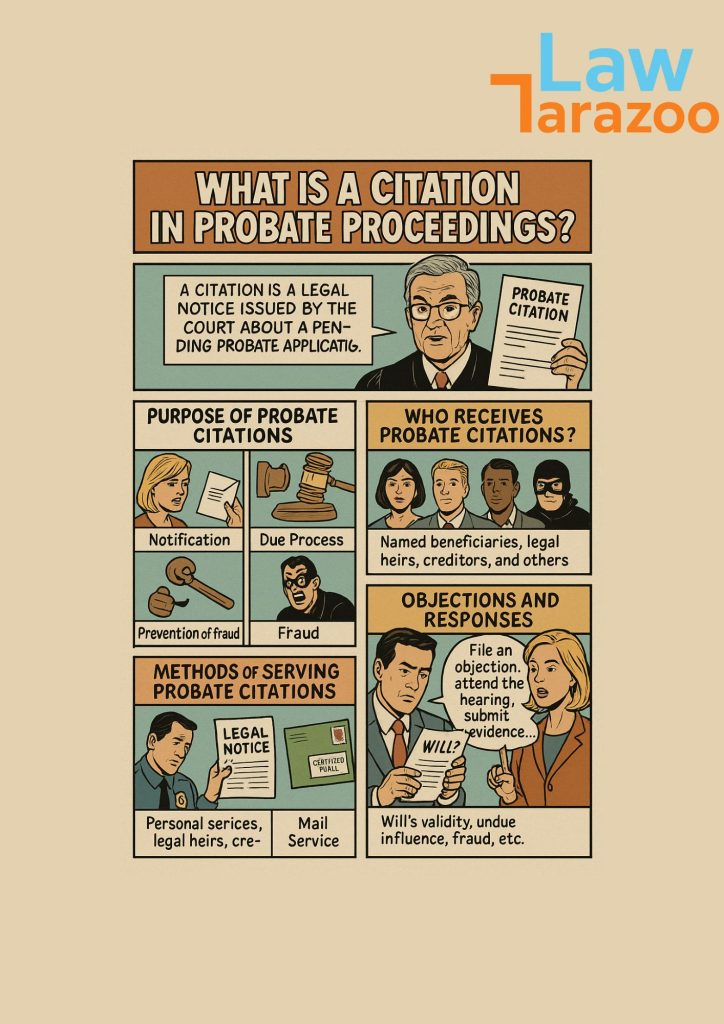When navigating the probate process after a loved one passes away, you may encounter various legal terms and procedures. Among these is the “citation” – a critical document that plays an essential role in ensuring the probate process is transparent and fair for all parties involved.
Understanding Probate Citations
A citation in probate proceedings is a formal legal notice issued by the court that serves as an official summons to interested parties about a pending probate application. This document represents a fundamental element of due process in estate administration, ensuring that all potential heirs and affected parties have the opportunity to participate in the proceedings.
Purpose of Probate Citations
The primary purposes of a citation include:
- Notification: Informing all interested parties about the probate application
- Transparency: Ensuring the probate process happens in the open
- Due Process: Giving potential heirs or objectors their legal right to be heard
- Prevention of Fraud: Reducing the risk of improper probate by making proceedings public
- Legal Protection: Shielding executors and administrators from future claims that proper notice wasn’t given
Who Receives Probate Citations?
Citations must be served on various parties who may have an interest in the estate:
- Named beneficiaries in the Will
- Legal heirs who would inherit if there was no Will
- Potential creditors with claims against the estate
- Spouses, children, and other close relatives
- Anyone named in a previous Will if a newer Will is being probated
- In some cases, relevant government agencies
Methods of Serving Probate Citations
Courts typically require citations to be served in specific ways to ensure all interested parties receive proper notice:
Personal Service
Direct, in-person delivery of the citation to the interested party, often by:
- A court officer
- Sheriff
- Process server
- Someone appointed by the court for this purpose
Publication
Public notification through:
- Local newspapers in the county where the deceased lived
- Legal journals or court-designated publications
- Online legal notice platforms in some jurisdictions
- Usually requires publication for a specific period (typically 1-4 weeks)
Mail Service
Delivery through certified or registered mail with:
- Return receipt requested
- Proof of delivery maintained for court records
- Specific timing requirements that vary by jurisdiction
Content of a Probate Citation
A properly drafted citation will typically contain:
- Case Information: Court name, case number, and estate identification
- Deceased’s Details: Full name, date of death, and last known residence
- Applicant Information: Name of the person filing for probate
- Application Type: Whether it’s for probate of a Will or administration of an intestate estate
- Response Period: The specific timeframe for filing objections
- Hearing Details: Date, time, and location of scheduled court appearances
- Legal Rights: Information about the right to contest or participate
- Instructions: Clear guidance on how to respond or object
Time Frames for Responding to Citations
The citation establishes a critical timeline for interested parties:
- Most jurisdictions allow between 30-90 days to file objections
- The “return date” on the citation indicates when the matter will proceed
- After this period expires, absent objections, the court typically grants the probate application
- Extensions may be granted for good cause in some circumstances
Objections and Responses to Citations
If someone wishes to contest the probate application after receiving a citation, they may:
- File a formal written objection with the court within the specified timeframe
- Attend the scheduled hearing to voice concerns
- Submit evidence challenging the Will’s validity or the appointment of the executor
- Request special proceedings to address specific concerns
Common grounds for objections include:
- Questions about the Will’s validity
- Claims of undue influence or fraud
- Concerns about the proposed executor’s fitness
- Evidence of a more recent Will
- Jurisdictional disputes
Legal Consequences of Citations
The citation process has significant legal implications:
For Applicants
- Ensures the probate application follows proper legal procedure
- Protects against future claims that interested parties weren’t notified
- Establishes clear timelines for moving forward with estate administration
For Interested Parties
- Creates a firm deadline for asserting rights or objections
- May bar future claims if timely objections aren’t filed
- Provides formal entry into the legal proceedings
For the Court
- Satisfies constitutional requirements for due process
- Creates a clear record of notification
- Establishes jurisdiction over all interested parties
Consequences of Failing to Respond to a Citation
If interested parties ignore a properly served citation:
- They may lose their right to object to the probate
- The court will likely proceed with the application as submitted
- Future challenges to the probate may be significantly limited
- They remain bound by the court’s decisions regarding the estate
Conclusion
Citations in probate proceedings serve as the foundation for a fair and transparent process. They ensure all interested parties have an opportunity to participate in decisions about a deceased person’s estate. Understanding what citations are, how they’re served, and the importance of responding to them can help both executors and potential beneficiaries navigate the probate process more effectively.
Whether you’re planning your estate or dealing with a loved one’s probate, knowing how citations work provides valuable insight into this important legal process.
#ProbateCitation #EstateLaw #ProbateProcess #LegalNotice #WillContest #ProbateHearing #EstateAdministration #ProbateNotice #InheritanceLaw #EstatePlanning

